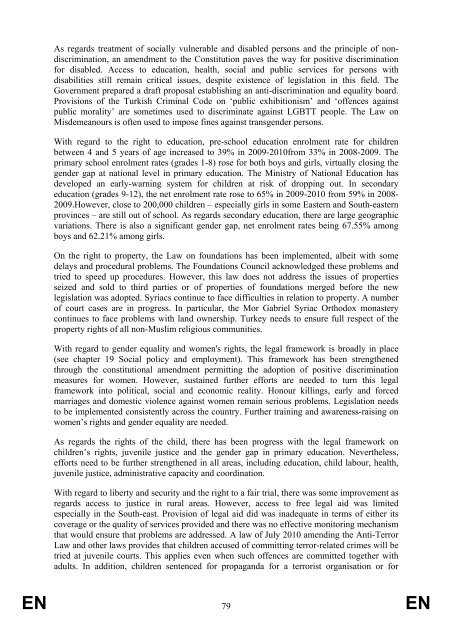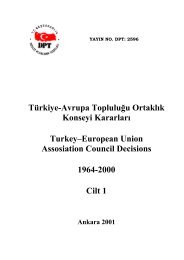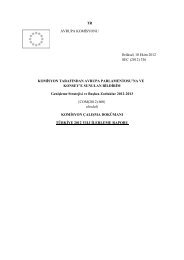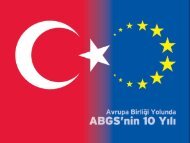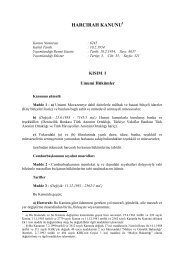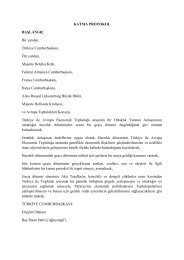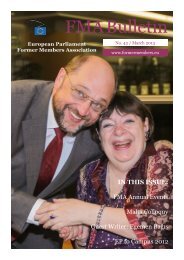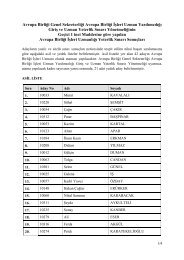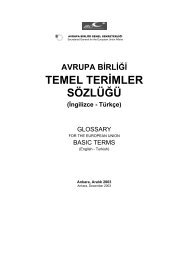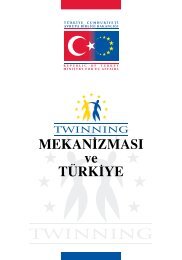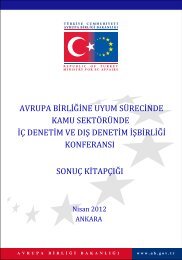2010 ilerleme raporu - Avrupa BirliÄi BakanlıÄı
2010 ilerleme raporu - Avrupa BirliÄi BakanlıÄı
2010 ilerleme raporu - Avrupa BirliÄi BakanlıÄı
Create successful ePaper yourself
Turn your PDF publications into a flip-book with our unique Google optimized e-Paper software.
As regards treatment of socially vulnerable and disabled persons and the principle of nondiscrimination,<br />
an amendment to the Constitution paves the way for positive discrimination<br />
for disabled. Access to education, health, social and public services for persons with<br />
disabilities still remain critical issues, despite existence of legislation in this field. The<br />
Government prepared a draft proposal establishing an anti-discrimination and equality board.<br />
Provisions of the Turkish Criminal Code on ‘public exhibitionism’ and ‘offences against<br />
public morality’ are sometimes used to discriminate against LGBTT people. The Law on<br />
Misdemeanours is often used to impose fines against transgender persons.<br />
With regard to the right to education, pre-school education enrolment rate for children<br />
between 4 and 5 years of age increased to 39% in 2009-<strong>2010</strong>from 33% in 2008-2009. The<br />
primary school enrolment rates (grades 1-8) rose for both boys and girls, virtually closing the<br />
gender gap at national level in primary education. The Ministry of National Education has<br />
developed an early-warning system for children at risk of dropping out. In secondary<br />
education (grades 9-12), the net enrolment rate rose to 65% in 2009-<strong>2010</strong> from 59% in 2008-<br />
2009.However, close to 200,000 children – especially girls in some Eastern and South-eastern<br />
provinces – are still out of school. As regards secondary education, there are large geographic<br />
variations. There is also a significant gender gap, net enrolment rates being 67.55% among<br />
boys and 62.21% among girls.<br />
On the right to property, the Law on foundations has been implemented, albeit with some<br />
delays and procedural problems. The Foundations Council acknowledged these problems and<br />
tried to speed up procedures. However, this law does not address the issues of properties<br />
seized and sold to third parties or of properties of foundations merged before the new<br />
legislation was adopted. Syriacs continue to face difficulties in relation to property. A number<br />
of court cases are in progress. In particular, the Mor Gabriel Syriac Orthodox monastery<br />
continues to face problems with land ownership. Turkey needs to ensure full respect of the<br />
property rights of all non-Muslim religious communities.<br />
With regard to gender equality and women's rights, the legal framework is broadly in place<br />
(see chapter 19 Social policy and employment). This framework has been strengthened<br />
through the constitutional amendment permitting the adoption of positive discrimination<br />
measures for women. However, sustained further efforts are needed to turn this legal<br />
framework into political, social and economic reality. Honour killings, early and forced<br />
marriages and domestic violence against women remain serious problems. Legislation needs<br />
to be implemented consistently across the country. Further training and awareness-raising on<br />
women’s rights and gender equality are needed.<br />
As regards the rights of the child, there has been progress with the legal framework on<br />
children’s rights, juvenile justice and the gender gap in primary education. Nevertheless,<br />
efforts need to be further strengthened in all areas, including education, child labour, health,<br />
juvenile justice, administrative capacity and coordination.<br />
With regard to liberty and security and the right to a fair trial, there was some improvement as<br />
regards access to justice in rural areas. However, access to free legal aid was limited<br />
especially in the South-east. Provision of legal aid did was inadequate in terms of either its<br />
coverage or the quality of services provided and there was no effective monitoring mechanism<br />
that would ensure that problems are addressed. A law of July <strong>2010</strong> amending the Anti-Terror<br />
Law and other laws provides that children accused of committing terror-related crimes will be<br />
tried at juvenile courts. This applies even when such offences are committed together with<br />
adults. In addition, children sentenced for propaganda for a terrorist organisation or for<br />
EN 79 EN


